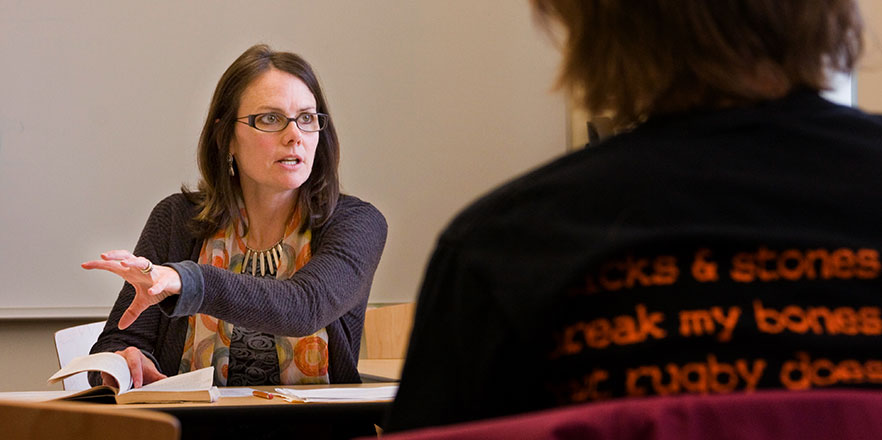Faculty Turn to Student Consultants to Improve Classes
By Savannah Tranchell

Suzanne Morrissey is always working toward being a better teacher.
The associate professor of anthropology and gender studies keeps her eyes open for workshops, on-campus programming and other training opportunities to improve her pedagogy.
But how do you know if efforts to improve courses are really working, and how they’re being received by students?
For that, you need an insider’s perspective.
This spring, Morrissey was one of a handful of faculty participating in the faculty-student consultant program, organized and offered through Whitman College’s Center for Teaching and Learning (CTL). Now entering its second year, the program connects faculty members with a student who will spend the semester evaluating a chosen course and giving direct feedback.
Morrissey was interested in receiving feedback focused on class dynamics — she wants to create spaces in her classrooms where all students are equally able to voice their opinions.
“My goal is to increase the ability for students who otherwise would maybe stay quiet in a classroom to have their own chances to participate and to shine,” she said. “I don’t necessarily know that my techniques are working in the ways that I want them to.”
To help her, she turned to anthropology-environmental studies major Hailey Hansen, a rising junior from Oak Park, Illinois. Hansen had previously taken Morrissey’s Introduction to Gender Studies course, and had expressed an interest in teaching and in public health.
“The goals of the consulting program are twofold: On one hand, for the faculty member to get the student perspective on how a class unfolds. And on the other hand, it’s about letting a student get behind Oz’s curtain and see how a class actually gets constructed,” Morrissey said. “How a faculty member has to change their pedagogy as they’re going along to fit the needs of changing dynamics — it gives the student some lessons in education.”
Hansen was thrilled to participate in the program. Early in the semester, the two met multiple times to discuss the elements of the class Morrissey wanted feedback on, which included how classroom space was used, when students tended to drift off-task and emotional responses to the course content.
Hansen spent the classes observing quietly, sometimes sitting in on small group discussions, other times just watching the class period unfold. It was excellent practice for building skills as an ethnographer.
“It was a really good practice run at anthropological research,” Hansen said. “I was using the methods of anthropological observation that I learned in my anthropology 101 class. I learned note-taking and observational skills that I’m definitely going to take into the future.”
A Win-Win for Education
The multi-layered benefit to both the student consultants and the faculty members is key to the program, said Associate Professor Ginger Withers, who coordinates the consultant program for the CTL. While the students are paid for their work, the role is much more than a job.
“I think it’s really helpful for the faculty, but it’s also really great for the students — especially students who are interested in a career in academics. It helps them gain a much deeper understanding of what goes into building a class,” Withers said.
Faculty don’t often get the opportunity to receive direct critical feedback from students, who may be afraid to approach them if something isn’t working in the class. The CTL offers training before the program begins to help each pair feel comfortable giving and receiving constructive criticism.
“I’m always trying to get feedback from students for things,” Withers said. “But they don’t expect you to ask or to really mean it, or they’re reluctant to say much.”
Hansen wasn’t intimidated to give Morrisey feedback, but she was worried that she wouldn’t be able to find anything to critique.
“She’s an excellent professor. When we met the first time, she said ‘You have to be really hard on me, you have to be critical,’ and I was like, ‘I don’t know what to criticize, she’s doing such a good job!’” Hansen said.
But as the semester unfolded, she was able to give feedback about how students were responding to the way time was used in class, and to take notice of when students would be doing other things on their laptops rather than paying attention.
“We’ve had some funny conversations, for example, ‘Why do so many students have to get up and go to the bathroom?’ Hailey and I will have that conversation at the same time my peers and I are having it. Why can’t students sit through an hour and 20-minute class?” Morrisey said. “So Hailey and I talked about if it would be beneficial to have a little five-minute break. So I tried that out — I was doing one activity at the beginning of class, and then we were shifting to a text discussion. There wasn’t an easy transition, so I gave the students a five-minute break in between. And we just tried that on together.”
The faculty-student consultant program is entering the second of its three-year funding this fall. Withers hopes that the college will be able to continue to use the consultants, and that faculty will be receptive to working with a student to improve their courses.
Hansen encourages students to seek out the program and be a consultant.
“It’s a great way to build relationships with professors. I feel like I’ve gotten to know Suzanne a lot better as a person. I feel like I can ask her questions regarding classes or just life,” Hansen said. “It’s a good way to sort of see and gain empathy for all the work that professors put in to the class. I found that I was a lot less likely in my other classes as a student to not drift off or not do the reading. I could see how much effort was being put into it on the professor’s side. It’s been a great opportunity.”